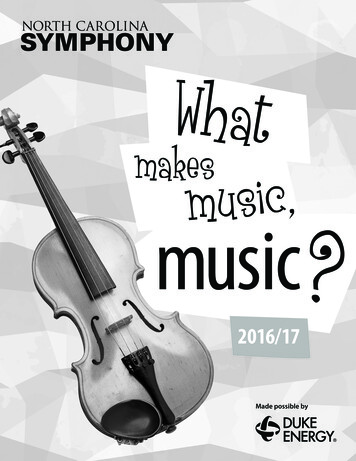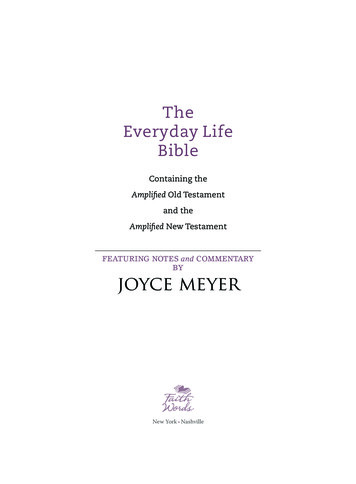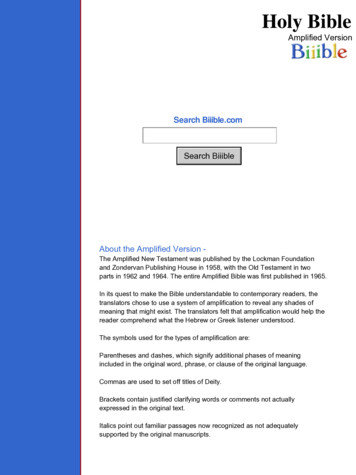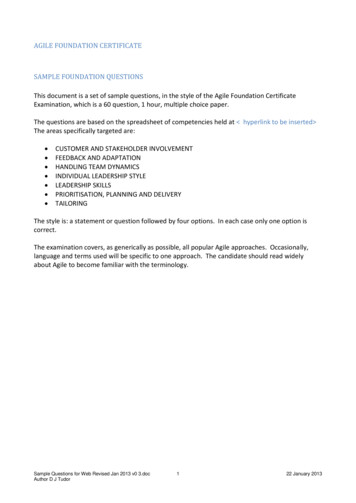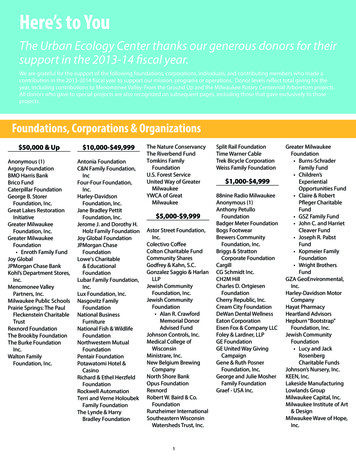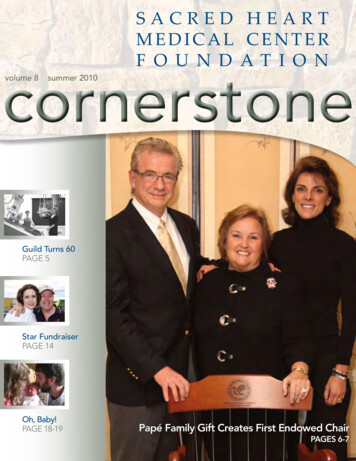
Transcription
Copyright 2011 Grace Bible Church, College Station, TXCreated and edited by the pastors and staff of Grace Bible Church.Scripture taken from the NEW AMERICAN STANDARD BIBLE , Copyright 1960, 1962, 1963, 1968, 1971, 1972, 1973, 1975, 1977, 1995by The Lockman Foundation, used by permission.This document may be reproduced and distributed freely,but you may not charge a fee greater than your manufacturing costs.No section of this document may be modified without the written consentof Grace Bible Church, College Station, TX.
IntroductionWelcome to our study of 1 Corinthians, a book that tackles some of the most difficult problemsany local church could face and that addresses many of the most controversial issues of our day,including the discipline of unruly church members and the role of women in the worship service.Yet beyond these problems and controversies, 1 Corinthians is first and foremost a book designedto convict us of sin and lead us towards maturity in life and faith, so that as a church family we mayever more fully glorify the One who called us into His grace.The eleven lessons in this packet are designed to walk us through this challenging book of theBible. During the Survey, we will look at the overall message of the book of 1 Corinthians. The nextten lessons will focus on studying key passages in detail. Then, in our last lesson (Synthesis), wewill summarize what we have learned for future reference.In studying each passage in detail, we will be learning and using a number of basic Bible studymethods. These methods fit under three fundamental skills that are meant to be practiced in ordereach week - observe, interpret, and apply. These skills are summarized on the next few pages,which are designed as a “Quick Reference Guide” that you can flip back through during your study.There are also advanced Bible study skills in the Appendix for those who want to go deeper in theirstudy.Table of ContentsBible Study Method Summary4Lesson 6 - 1 Corinthians 9:1-14671 Corinthians Survey10Lesson 7 - 1 Corinthians 11:2-3477Lesson 1- 1 Corinthians 1:1-2:1617Lesson 8 - 1 Corinthians 12 & 1487Lesson 2 - 1 Corinthians 3:1-4:527Lesson 9 - 1 Corinthians 13:1-1397Lesson 3 - 1 Corinthians 5:1-6:837Lesson 10 - 1 Corinthians 15:1-58107Lesson 4 - 1 Corinthians 6:9-7:4047Lesson 11 - 1 Cor. Synthesis117Lesson 5- 1 Corinthians 8:1-11:157Appendix - More Study Skills1253
Observe: What do I see?Every time we study the Bible, the first thing to ask is, “What do I see?” This is the crucialskill of observation, which lays the groundwork for the rest of our study. Here are four tasksinvolved in observation which should be performed in the order below:Observation Task 1:BIBLE STUDY METHODS QUICK REFERENCE GUIDEfollowing specific elements:Mark up the passage by visually identifying the Underline all verbs. A verb is a word or group of words used to indicate either that anaction takes place (“I thank my God”) or that a state or condition exists (“God is faithful”).Verbs are often the most significant indicators of the author’s flow of thought. Circle key words or phrases. These are words or short phrases that are importanttheologically (like “word of the cross” in 1:18 or thematically set the theme or main idea forthe passage (like “wisdom” and “foolishness” in 1:18-31). Highlight repeated words or phrases. Include words and phrases that are closely relatedeven if not exact duplicates (such as “judgment” and “judging”). You will want to highlightthings repeated in other places (such as “Now concerning” found in 7:1, 25; 8:1; 12:1;16:1). Box connecting words. These important words indicate the logical connection betweenwords, phrases, and clauses. Here are eight types of common connecting words to look for:1. COMPARISON: either points out similarities between two or more related ideas or simplyjoins like ideas. Comparison words include: and, like, as, just as, also, so also, even so(e.g. “LIKE a wise master builder I laid a foundation” 3:10).2. CONTRAST: points out dissimilarities between ideas. Contrast words include: but, rather,yet, however (e.g. “Jews ask for signs.BUT we preach Christ crucified” 2:22-23).3. PURPOSE: indicates the intended goal of an idea or action, whether or not it was realized.Purpose words include: that, so that, in order that (e.g. “I have made myself a slave toall THAT I may win the more” 9:19).4. RESULT: very similar to “purpose,” but indicates the actual consequence, whether or not itwas intended. Result words include: that, so that, as a result, with the result that (e.g.“I baptized none of you except Crispus and Gaius SO THAT no one would say.” 1:14-15).5. CAUSE: expresses the basis or cause of an action. Cause words include: because, since,and sometimes for (e.g. “I praise you BECAUSE you remember me in everything” 11:2).6. EXPLANATION: what follows further explains the previous idea, giving reasons why it istrue, why it occurred, or simply adding additional information. Look for the key word for(e.g. “FOR by one spirit we were all baptized into one body” 12:13).4
7. INFERENCE: provides a logical consequence, conclusion, or summary to the previousdiscussion. Inference words include: therefore, for this reason (e.g. “FOR THIS REASONI have sent you to Timothy” 4:17).8. CONDITION: presents a condition that must occur before a certain action or conclusioncan occur. The statement may or may not reflect reality (i.e. it could be hypothetical). Keyword is if (e.g. “IF any man’s work which he has built on it remains, he will receive a reward”3:14).A primary theme is the big idea, the central truth or command that the passage focuseson, such as “the wisdom of God” and “the Spirit reveals truth” in 1:18-2:16. After reading thepassage, write your themes as single words or short phrases. Identifying these themes at thebeginning of your study will help you develop a good overall grasp of the passage.Observation Task 3: Write two or more observations per verse.Our observations might identify people, places, or events, point out repeated wordsor key terms, record important connections between words and sentences, or even point outsomething missing that we expected to see.Observation Task 4: Record your own interpretive questions.Here are a few examples:WHO is.Paul talking about?.accomplishing the action?.benefiting from the action?WHAT is the.meaning of this word?.significance of this phrase?.implication of this statement?.relationship between these phrases?WHY did Paul.choose this word?.include this phrase, statement, or command?.connect these ideas?.not say ?BIBLE STUDY METHODS QUICK REFERENCE GUIDEObservation Task 2: List 2-3 primary themes you see in the passage each week.HOW.was this action accomplished?.will this situation occur?5
INTERPRET: What does it mean?Our observation of a passage should stir interesting yet challenging questions, leading us tothe second stage of our Bible study, interpretation. Fortunately, we do not have to run to acommentary or study Bible for answers (though these are helpful tools to check our conclusions).Use the following six methods, as needed, to tackle a variety of questions. Also, make sure tofamiliarize yourself with the three “Principles of Interpretation” that appear in the Appendixon page 126.BIBLE STUDY METHODS QUICK REFERENCE GUIDEInterpretation Method 1: Use the context.6Look for important clues in the sentences and paragraphs that come before and afterthe verse in question. Try to follow Paul’s flow of thought through the whole chapter. This maytake you to the previous lesson, so have it handy as a review. You may need to read ahead in 1Corinthians for clues.Interpretation Method 2: Compare multiple translations.This packet uses the New American Standard (NASB) translation. You can often findhelpful interpretive clues by comparing this translation with other translations. The NewKing James Version (NKJV), like the NASB, is a fairly word-for-word translation of the Greektext. The New International Version (NIV) and the New Revised Standard Version (NRSV) areexcellent phrase-to-phrase translations of the Greek and are thus often easier to read. Anotherexcellent phrase-to-phrase Bible, which includes extensive translation notes, is the New EnglishTranslation (NET) available online for free at www.bible.org. You can find and comparenumerous translations of any Bible passage at www.biblestudytools.com.Interpretation Method 3: Look up key words.While looking up a key word in English is helpful, doing so in Greek is far better and issurprisingly easy, thanks to the internet. Simply log onto www.biblestudytools.com, typein “1 Cor 5” in the box to the left of the “Search” button and then click “Search.” All of 1 Cor 5will appear on the screen. Be sure that “New American Standard” is your selected Bible in thedrop down box and then click the box next to “Strongs Numbers” so that most of the words willbe highlighted in blue. Clicking on any of these will bring up a new screen that will tell you theGreek word used here, its possible definitions, and the total number of times it is used in eachbook of the NT! You can even click on any of the other NT books (under the title “NAS VerseCount”) and get a list of every verse in that book that uses this Greek word! What used to takehours now takes seconds.
Interpretation Method 4: Study cross-references (Xrefs).Interpretation Method 5: Look up background information.You can find helpful insights by looking up confusing names or words in a Bible dictionaryor by looking up the particular verses you are studying in a background commentary. One ofthe best dictionaries is The New Bible Dictionary by Wood & Marshall, but you can also find theolder Int’l Standard Bible Dictionary [ISBE] online for free (net.bible.org/dictionary.php). TheIVP Bible Background Commentary by Craig Keener is an excellent example of a verse-by-versebackground commentary.Interpretation Method 6: Tackle tough questions step-by-step.When trying to answer the most challenging questions, follow this four-step process:(1) LIST ALL THE OPTIONS. Always start by brainstorming every possible answer to yourquestion. (2) LIST PROS AND CONS FOR EACH OPTION. See all the evidence you can findthat either argues for or against a particular option. This evidence comes from your study ofkey words, the grammar of the sentence, the context of surrounding verses and the book asa whole, cross references to other books, and comparison with your overall understanding ofChristian theology. (3) CHOOSE THE MOST LIKELY OPTION. Look at your evidence for eachoption. Typically, evidence from the immediate context is most important, followed closely byevidence from the book as a whole. Evidence from other books of the Bible, or from Christiantheology as a whole, does not carry quite as much weight unless the solution contradicts aclear passage elsewhere or a major tenant of Christian doctrine. In that case, since Scripturenever lies and God cannot contradict Himself, you must eliminate that option. (4) DECIDE ONYOUR CERTAINTY LEVEL. Once you have chosen the best solution, step back for a second andhumbly gauge how certain you are of its accuracy (90% I am very sure this is correct . 60% This solution is just a bit more likely than the others!). Finally, talk with others and checkcommentaries or reference books to see what solutions they have chosen and why.BIBLE STUDY METHODS QUICK REFERENCE GUIDEXRefs are simply other passages in the Bible that are somehow related to the versesyou are studying. They often prove incredibly helpful as we seek to understand our passage.You can find a few XRefs in the margins of most Bibles, but you can find many more by loggingonto another helpful website: net.bible.org. In the top left of the screen under “Display Bible,”choose “1 Corinthians,” then the chapter you are interested in, and then click “Go.” A new screenwill appear with the NET Bible translation of the chapter you requested. Click the “XRef” tab atthe top of the screen, and this will take you to an extensive list of XRefs for every verse in thischapter based on the classic book The Treasury of Scripture Knowledge. Clicking any of these willbring up the single verse, but you can then click “context” to see the verse in the midst of itssurrounding context.7
apply: How does it work?Our Bible study is not over until we apply what we have learned to our everyday lives. And lestwe underestimate the value of this last step, remember that in God’s eyes it is the person whodoes not just know His Word, but also obeys His Word, that truly loves Him (See John 14:21).So how do we apply a passage to our lives? Application involves the following two tasks:BIBLE STUDY METHODS QUICK REFERENCE GUIDEApplication Task 1: List potential principles from your passage.8A “principle” is simply a fact or command stated or implied in a particular passage thatis practically relevant to our lives. Legitimate principles are not specific to a particular person(e.g. 1 Tim 5:23 is just for Timothy) nor a particular time (e.g. “do not leave Jerusalem” inActs 1:4). An example from 1 Corinthians 2 would be, “We can find true wisdom by readingGod’s Word as we rely on His Spirit to help us understand it.” It is often helpful when listingprinciples to consider the following questions:pp Is there something to worship or thank God for?pp Is there a promise for me to claim or a truth for me to believe?pp Is there something I am convicted about that I need to change or begin doing?pp Is there something or someone I need to pray for specifically this week?pp Is there any relationship I need to work on?Application Task 2: Choose one principle, and create a plan to apply it to yourlife this week.Once you complete your principle list, prayerfully choose the one principle you most needto work on (Do not just choose the easiest to apply!). If you felt deeply convicted about one inparticular, that is probably the principle God is leading you to apply. Once you have chosen aspecific principle, answer these two questions:exactly will I do differently this week to apply this principle to my life (Be specific)?pWhatppWhom,pother than the Lord, will I ask to help me follow through with this application?
My notes9
See the Big Picture1 Co r inthia n s sur vey10 / SURVEY
PrayBegin this time in prayer, confessing any sins you know of, thankingthe Lord for the gift of His Word, and asking for His Spirit to guideyour study.Why does this matter?You wake suddenly one morning with a sharp pain in your chest, a pain thatquickly becomes unbearable. Fortunately, you have time to call 911 before youblack out and fall to the floor. Hours later (or even days for all you know) youawake to the sound of your doctor’s voice. She looks grave as she explains that youare suffering from not just one, but several potentially deadly ailments. You havea serious case of dehydration, one of your arteries is severely blocked, you havean ulcer bleeding into your stomach, and you have a growing bacterial infectionspreading throughout your body. Yet fortunately, all of these conditions aretreatable with the right surgeries and medications. Better yet, all are avoidable inthe future, if you follow your doctor’s instructions: drink more water to preventdehydration, cut way back on fatty foods to lower cholesterol and open up your arteries, quit poppingIbuprofen every couple hours to avoid the ulcers, and lay off the under cooked, salmonella-prone chicken!oAll the advice given here is common knowledge that all of us should follow. So why do somany people ignore such medical wisdom every day?This case study may seem far removed from a Bible study of 1 Corinthians. Yet such a medicalscenario may be the closest metaphor to describe Paul’s purpose in writing this complex letter.No one issue dominates his discussion; yet, almost every chapter addresses a serious problemaffecting the Corinthian church. And each problem, if left unchecked, could eventually destroythis ailing local body of believers. While our church may not suffer the severity of symptomsfound in this letter, we would do well to learn from Paul’s instruction and practice his wiseadvise now so that we can avoid the severe pain and heartache experienced by many of thebelievers in 1st century Corinth.11 / SURVEY
SKILLsurvey: What is the big idea?Surveying a book like 1 Corinthians allows you to grasp the big picture and the overall storylineof the book before getting caught up in the details. This survey provides a helpful road mapto guide your study during the coming weeks. Begin this crucial first step by taking the nextthirty minutes to read straight through 1 Corinthians without stopping. Then, answer thequestions below before moving on to the next page.1.Having read the book, how would you describe the church in Corinth? In whatways are they healthy? What “deadly ailments” do they suffer from?2.How would you describe Paul’s relationship to these believers?3.What are the major themes or big ideas in this book? (Hint: Look for repeatedwords and ideas.)12 / SURVEY
backgroundOnce you have completed the introductory questions on the previous page, read this backgroundarticle on the book of 1 Corinthians (portions have been compiled from The Bible KnowledgeCommentary and Nelson’s Illustrated Bible Dictionary).aUTHOrsHIPPaul, the Apostle to the Gentiles, went alone from Athens to Corinth in about A.D. 51 during hissecond missionary journey (Acts 18:1-18). There he labored with a Jewish-Christian couple, Aquilaand Priscilla, who recently had been expelled from Rome by the emperor Claudius because theywere Jews. The couple ran a tent-making business, a trade also practiced by Paul. Silas and Timothyalso joined Paul in Corinth. When Paul left Corinth 18months later, headed to Ephesus with Priscilla andAquilla, a Christian congregation had been foundedin the city of Corinth. After a period of training, Paulwould later send the gifted Alexandrian Apollos toCorinth for ministry there (Acts 18:24-28). WhileApollos was ministering in Corinth (Acts 19:1), Paulremained in Ephesus on his third missionary journeyin the fall of A.D. 53 for a period of about two and onehalf years (Acts 19). It was probably during the earlypart of this ministry in Ephesus that Paul wrote the“Saint Paul Writing His Epistles” by Valentinletter mentioned in 1 Corinthians 5:9. Paul learned ofde Boulogne (ca. 16th century)the church’s misunderstanding of this first letter (1Cor 5:10-11) and of further problems in the church at Corinth from the household of Chloe (1:11).Then an official delegation - Stephanas, Fortunatus, and Achaicus (16:17) brought Paul specificquestions on issues dividing the church. Paul, the anxious pastor, would write 1 Corinthiansprobably in A.D. 54 or 55 to address these matters.reCIPIeNTThis fledgling congregation in Corinth was composed primarily of former “idol-worshippers” (1Cor 12:2), but some Jewish believers were also among them. Most of them were from the lowerclasses (1 Cor 1:26-28). Some were slaves (1 Cor 7:21). A few were wealthy (1 Cor 11:22-32). Thesenew believers struggled mightily to live out their new Christian faith in a culture resistant andeven hostile to their faith.Corinth, ancient Greece’s most important center of trade, was ideally situated on the Isthmusof Corinth connecting Rome, the capital of the world, and the East. Like its neighboring city ofAthens, Corinth symbolized Greek culture in its desire for wisdom and power. The ancient city hada reputation for vulgar materialism. In the earliest Greek literature it was linked with wealth andimmorality. When Plato referred to a prostitute, he used the expression “Corinthian girl.” Much of13 / sUrvey
The Temple of Apollo at Corinth and the acropolis in the background.the wealth and vice in Corinth centered around the temple of Aphrodite, the goddess of love andbeauty in Greek mythology, and its one thousand temple prostitutes. For this reason a proverbwarned, “Not for every man is the voyage to Corinth.”PUrPOse1 Corinthians provides a glimpse of life inside a first-century church that was far from saintly. Thespirit of the world seemed more influential in the Corinthian church than the Spirit of God. Paulwrote to young Christians who were concerned with problems involved in living out the Christianlife in a non-Christian culture. Since many of the problems arising in Corinth concerned behaviorand morals, Paul majored on ethical advice in this correspondence, addressing issues of disunity,immorality, marriage, eating food sacrificed to idols, and order in the worship service itself.14 / sUrvey
Outline the bookIf time permits, skim through 1 Corinthians one more time and then create your own title for each chapterof the book (you can divide these into smaller sections, each with its own title, if you wish). Do not use thetitles in this packet or in your Bible. Create your own titles that capture your understanding of the mainidea of each section.My I Corinthians Titles.pp Ch. 1pp Ch. 9pp Ch. 2pp Ch. 10pp Ch. 3pp Ch. 11pp Ch. 4pp Ch. 12pp Ch. 5pp Ch. 13pp Ch. 6pp Ch. 14pp Ch. 7pp Ch. 15pp Ch. 8pp Ch. 16PrayEnd your study by returning to the Lord in prayer. Thank Him for what youhave learned this week, ask Him to help you apply the principle you havechosen, and lay before Him the needs of your fellow small group members.15 / SURVEY
My notes16 / SURVEY
Know the Truth1 co rinthia n s 1:1-2:1617 / LESSON 1
PrayMemorizeBegin this time in prayer, confessing any sins you know of,thanking the Lord for the gift of His Word, and asking for HisSpirit to guide your study.1 Corinthians 1:21 Write it out to get your memorization started.Why does this matter?You lost Ted at “God loves you.” In fact, every time you try to share the gospel with this intelligent, witty,and completely secular friend, he stops you cold at the first mention of God. “How can you possibly stillbelieve in a god? You’ve read the same textbook I have in our biology class,you’ve attended the same lectures, you’ve studied the same scientificevidence. It’s simply absurd to hold onto this myth about some all-powerfulGod creating us.” Once started, Ted usually launches into an impassionedmonologue deriding the foolishness of your devotion to a 2000 year oldbook, your belief in actual miracles, and most absurd, your prudish andstubborn refusal to enjoy the benefits and pleasures of this life for thesake of a supposed life after death. Regardless of any evidence or logicalarguments you offer for God’s existence and Christianity’s reasonableness,Ted simply shrugs them off as laughable attempts to prop up a ridiculousstory.oDo you have friends or relatives who think your Christian faith is foolish? What reasons do theygive for their assessment?18 / LESSON 1
Look at the whole passage1 Corinthians 1:1-2:16Read this entire passage, and as you do, write down any key themes. A theme is a central idea, truth, orcommand that is the focus of the passage, such as “the wisdom of God” and “the Spirit reveals truth”in 1:18-2:16. After reading the whole passage each week, write your themes as single words or shortphrases. Identifying these themes at the beginning of your study will help you develop a good overallgrasp of the passage.After listing key themes, come up with a short title for this section of 1 Corinthians.My TitleMy ThemesObserve: What do I see?Every time we study the Bible, the first thing to ask is, “What do I see?”. This is the crucialskill of observation, and it lays the groundwork for the rest of our study. We will learn a newobservation skill each week to practice along with the others we have already learned. Thisweek, simply read the passage on the following page, and then write one or two observationsfor each verse in the box that follows. Our observations might identify people, places, orevents, point out repeated words or key terms, record important connections betweenwords and sentences, or even point out something missing that we expected to see. Thefirst few have been done for you.SKILLFocus on One Key Section: 1 Corinthians 1:18-21 & 2:6-1619 / LESSON 1
1 Corinthians 1:18-21 and 2:6-16For the word of the cross is foolishness to those who are perishing, but to us who are being saved1:18it is the power of God. For it is written, “I WILL DESTROY THE WISDOM OF THE WISE, AND THECLEVERNESS OF THE CLEVER I WILL SET ASIDE.” 20Where is the wise man? Where is the scribe? Whereis the debater of this age? Has not God made foolish the wisdom of the world? 21For since in the wisdomof God the world through its wisdom did not come to know God, God was well-pleased through thefoolishness of the message preached to save those who believe.Yet we do speak wisdom among those who are mature; a wisdom, however, not of this age nor of the2:6rulers of this age, who are passing away; 7but we speak God’s wisdom in a mystery, the hidden wisdomwhich God predestined before the ages to our glory; 8the wisdom which none of the rulers of this agehas understood; for if they had understood it they would not have crucified the Lord of glory; 9but justas it is written, “Things which eye has not seen and ear has not heard, And which have not entered theheart of man, All that God has prepared for those who love Him.”For to us God revealed them through10the Spirit; for the Spirit searches all things, even the depths of God.For who among men knows the11thoughts of a man except the spirit of the man which is in him? Even so the thoughts of God no oneknows except the Spirit of God.Now we have received, not the spirit of the world, but the Spirit who12is from God, so that we may know the things freely given to us by God,which things we also speak,13not in words taught by human wisdom, but in those taught by the Spirit, combining spiritual thoughtswith spiritual words. 14But a natural man does not accept the things of the Spirit of God, for they arefoolishness to him; and he cannot understand them, because they are spiritually appraised. 15But he whois spiritual appraises all things, yet he himself is appraised by no one. 16For who has known the mind ofthe Lord, that he will instruct Him? But we have the mind of Christ.20 / LESSON 1
My observationsList at least 2 observations per verse in the space below.vv 1:18-21- Verse 20 is composed of four questions- All four questions look at someone or something the world values- Verse 21 begins with the connecting word “for”- Paul contrasts the wisdom of God with the wisdom of the world- The people who are saved are “those who believe”vv 2:6-9vv 2:10-13vv 2:14-1621 / LESSON 1
SKILLINTERPRET: What does it mean?Our observation of 1 Corinthians each week will stir up some of the most interesting andchallenging questions encountered in Bible study. Fortunately, we do not have to run to acommentary or study Bible for the answer (though these are helpful tools to check ourconclusions). God desires all of us to become approved workmen, “accurately handling theWord of truth” (2 Tim 2:15). To that end, we will learn a new interpretive skill eachweek to practice along with the others we have already learned. This week’s skill is the mostimportant: use the context. Look for important clues in the sentences and paragraphsthat come before and after the verse in question. Try to follow Paul’s flow of thought throughthe whole chapter. This may take you to the previous lesson, so have it handy as a review. Youmay also need to read ahead in 1 Corinthians for clues.1.What does Paul’s lengthy comparison of human wisdom and God’s gospel tell us about thestate of the Corinthian church in these first 2 chapters?2.How does the “wisdom of God” differ from the “wisdom of the world”?3.According to 1:18-31, how does the “word of the cross” uniquely demonstrate the power ofGod (see also Romans 1:16-17)?4.Apart from the “wisdom of God” delivered to us in the Bible and without the Scriptures, whatcould we know of God (see also Psalms 19:1-2; Ecclesiastes 3:11; Romans 1:18-23, 28)?22 / LESSON 1
5.According to 1:18-2:16, what are the steps required for a person to understand the wisdom ofGod?6.According to the following passages, what can prevent a believer from understanding thewisdom of God revealed in His Word?1 Corinthians 2:14-15John 14:212 Timothy 2:14James 1:5-87.Is the Bible absolutely essential to know God? Why or why not?My summaryIn one sentence, use your own words to describe the main point that Paul communicates in this passage.23 / LESSON 1
apply: How does it work?SKILLIn God’s eyes it is the person who does not just know His Word, but also obeys His Word whotruly loves Him (John 14:21). Our Bible study is only complete once we apply what we’velearned. To that end, we will learn the first two steps in the process of application this week.First, start each lesson by answering a few reflection questions designed to demonstrate howeach passage relates to our own lives. Second, step back and look at the passage as a wholeand list potential principles. A “principle” is simply a fact or command stated or impliedin a particular passage that is practically relevant to our lives. Legitimate principles are notspecific to a particular person (e.g. 1 Timothy 5:23 is just for Timothy) nor a particular time(e.g. “do not leave Jerusalem” in Acts 1:4). A couple of examples are provided for you on thenext page.Reflect on your lifeoWhat people, groups, or institutions, does your generation typically turn to as an authorityon truth?oWhy does our culture view these sources of authority as more appealing or convincingthan Scripture?oDo you ever feel like the Bible is either too hard to understand or too distant to be of usein modern life?24 / LESSON 1
List principlesList at least five principles from 1 Corinthians 1:18-2:16. (Remember, a principle is simply a fact orcommand stated or implied in
text. The New International Version (NIV) and the New Revised Standard Version (NRSV) are excellent phrase-to-phrase translations of the Greek and are thus often easier to read. Another excellent phrase-to-phrase Bible, which includes extensive translation notes, is the New English Translation (NET) available online for

